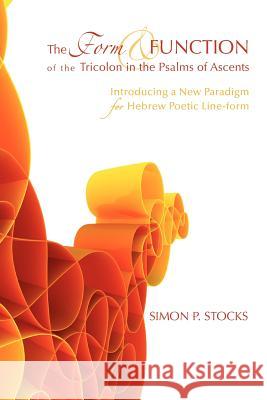The Form and Function of the Tricolon in the Psalms of Ascents: Introducing a New Paradigm for Hebrew Poetic Line-Form » książka
The Form and Function of the Tricolon in the Psalms of Ascents: Introducing a New Paradigm for Hebrew Poetic Line-Form
ISBN-13: 9781610978088 / Angielski / Miękka / 2012 / 292 str.
The Form and Function of the Tricolon in the Psalms of Ascents: Introducing a New Paradigm for Hebrew Poetic Line-Form
ISBN-13: 9781610978088 / Angielski / Miękka / 2012 / 292 str.
(netto: 154,92 VAT: 5%)
Najniższa cena z 30 dni: 161,32
ok. 16-18 dni roboczych.
Darmowa dostawa!
Synopsis:This book explores the little-regarded phenomenon of the tricolon in biblical Hebrew poetry, that is, those poetic lines that appear to have a tripartite form rather than the more common bipartite form. Taking the Psalms of Ascents as a sample corpus of poetic texts, it identifies tricola on an explicit and consistent basis. It draws on the rhythmical-accentual approach of Eduard Sievers, and in so doing highlights an important but neglected aspect of his method. The concept of a "para-tricolon" is developed, designating a line that is tripartite, yet rhythmically equivalent to a conventional bicolon. Analyses of psalm structures and of the syntactic and semantic structures of each tripartite line facilitate an assessment of the function of, and characterization of, tripartite lines. The significance of enjambment is explored as a distinguishing factor between different line-forms and as a means of uniting non-parallel cola.The study demonstrates clear differences between the form and function of para-tricola and those of tricola, and so will facilitate a more nuanced and realistic appraisal of the functional significance of Hebrew poetic line-forms.Endorsements:"While many of the basic elements of Hebrew poetry have long been established, there remain features which have not been adequately analyzed, and intricacies and subtleties which merit further investigation. Stockss study provides a fine example of a careful structural and colometric analysis, which provides the foundation for his proposals concerning the significance of the tricolon and his proposed para-tricolon. A welcome contribution to the study of Hebrew poetry!"--Adrian Curtis, University of Manchester"This detailed analysis of the colometric structure of the Psalms of Ascents points to some drawbacks in previous research. To overcome these shortcomings, Stocks introduces--alongside the bicolon and the tricolon--the para-tricolon. This type of verse line, he argues, is colometrically equivalent to the tricolon, but rhythmically equivalent to the bicolon. His well-balanced approach also takes into account the recent results of strophic and rhetorico-structural analysis."--Pieter van der Lugt, author of Cantos and Strophes in Biblical Hebrew Poetry "Stockss careful study of the occurrences of tricola in the Psalms of Ascents greatly advances our understanding of this unusual phenomenon. Rather than simply saying Well, some parallelisms are just like that, scholars of Hebrew poetry have now been given greater insight into what tricola do and how they do it. In short, this is a study that every student of Hebrew poetics should take and read."--Jamie Grant, Highland Theological College UHI"Stocks brings methodological rigor and clarity to this complex area, providing a means of understanding the tricolon while at the same time opening up new vistas on how the poetic line can be formed and function . . . This clear and insightful study provides us with a way forward in understanding this important area of biblical poetics."--David G. Firth, St Johns College, From the ForewordAuthor Biography:Simon Stocks is Tutor for Biblical Studies and Lay Ministry at the South East Institute for Theological Education, UK.











